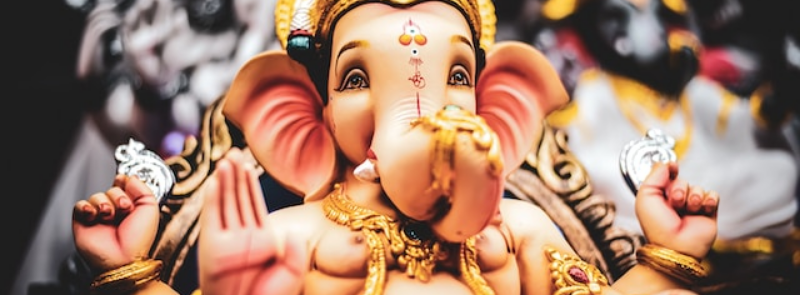
When It Occurs
Annually Fourth Day of Hindu Month Bhadrapada
Timeline
Days Passed (533)
# Hashtags
#GaneshChaturthi #LordGanesha
Ganesh Chaturthi is a Hindu festival spanning 10 days, dedicated to celebrating the birth of Lord Ganesha, the deity associated with wisdom and prosperity. Commencing on the fourth day of the sixth month in the Hindu calendar, Bhadrapada, typically falling in August–September, the festival is also recognized as Vinayak Chaturthi or Ganeshotsav.
During this festive period, clay idols of Lord Ganesha are ceremoniously installed in homes and temples. Devotees prepare by cleaning their homes, warmly welcoming the idol, and presenting offerings such as flowers, durva grass, modaks, and karanji in worship of Lord Ganesha.
Significance of Ganesh Chaturthi
Ganesh Chaturthi marks the arrival of Lord Ganesha to earth from Mount Kailash with his mother, Goddess Parvati. It is a time to seek blessings from the deity for wisdom, prosperity, and the removal of obstacles. The festival reflects the Hindu belief that Ganesha is the "remover of obstacles" and the "lord of beginnings," making it an auspicious time for new ventures, studies, and endeavors.
Celebrations in the United Kingdom
In the UK, Ganesh Chaturthi is observed with a mix of traditional practices adapted to local customs and community gatherings. While the festival is celebrated in homes, it has also become a significant public event in some areas. Here’s how it is celebrated:
1. Community Events and Public Celebrations
- Temples and Cultural Organizations: Many Hindu temples in the UK, such as the Shree Ganapathy Temple in London, organize special prayers and festivities for Ganesh Chaturthi. These temples hold elaborate pujas (rituals) and aarti (prayer ceremonies), where devotees offer prayers and participate in the spiritual chanting of hymns.
- Cultural Shows and Processions: In cities like Leicester, which has a large Hindu community, public events are organized. These may include cultural performances, traditional music, dance, and even processions similar to those held in India, though on a smaller scale. Some communities may have a Ganesh idol procession, where a statue of Lord Ganesha is carried to a local river or water body for immersion.
2. Ganesha Idols
- Eco-Friendly Idols: In the UK, like in India, there has been a growing awareness of the environmental impact of immersing idols made of plaster of Paris. As a result, many devotees now use eco-friendly idols made from clay or biodegradable materials, which dissolve quickly when immersed in water, ensuring minimal harm to the environment.
3. Rituals and Prayers
- Ganesh Puja: On the day of Ganesh Chaturthi, families and devotees perform Ganesh Puja in their homes or at temples. This involves offering modaks (a sweet dumpling believed to be Ganesha’s favorite), fruits, flowers, and incense to the deity. The ritual begins with the Pranapratishtha, a ceremony that involves invoking life into the idol, followed by shodashopachara, a set of 16 worship services.
- Aarti: Aarti is performed several times a day, especially in temples, where devotees gather to sing hymns in praise of Ganesha. The most popular aartis include the Sukhkarta Dukhharta aarti, which is sung at many Ganesh Chaturthi celebrations.
4. Modak and Prasad
- Modak is a special offering made to Lord Ganesha. This sweet dumpling is often made from rice or wheat flour with a filling of grated coconut and jaggery, symbolizing sweetness and purity. Many families in the UK prepare modak or other traditional sweets like laddus and distribute them as prasad (blessed food) after the puja.
- In the UK, traditional sweets and prasad can also be ordered from Indian sweet shops or local Hindu temples, where they are prepared in bulk for devotees.
5. Immersion (Visarjan)
- The festival traditionally culminates with the immersion of the idol of Lord Ganesha into a body of water, symbolizing his return to Mount Kailash. In the UK, where water bodies may not always be accessible or appropriate, eco-friendly alternatives are often sought. Some temples have private water tanks or arrangements for immersion, while others have adopted symbolic immersion rituals using smaller idols that can be dissolved in a bucket of water at home.
- Clay Ganesha idols are preferred for this purpose, as they dissolve easily without harming the environment. After immersion, the water is often poured into a garden or onto plants as a way to return the elements to nature.
6. Virtual Celebrations
- Since the COVID-19 pandemic, many celebrations have moved online. In the UK, this has become a trend, where families and communities participate in virtual pujas and ceremonies streamed from temples. These virtual events allow devotees to participate in rituals even if they are unable to attend in person, creating a sense of community and togetherness.
Importance in the Hindu Community
In the UK, Ganesh Chaturthi is more than just a religious event—it is a cultural celebration that brings the Hindu community together. It is a time for spiritual reflection, family gatherings, and the strengthening of community bonds. The festival also plays a key role in passing down cultural values and traditions to younger generations of British-born Hindus, helping them stay connected to their roots.
Public Awareness and Inclusivity
Ganesh Chaturthi in the UK has also become a way to introduce the broader community to Indian culture and Hindu traditions. Many non-Hindus attend public events, temple ceremonies, and community celebrations to learn about the significance of Lord Ganesha. This promotes cultural inclusivity and diversity, which are key values in British society.
Conclusion
Ganesh Chaturthi in the UK reflects the deep cultural and spiritual connection that the Hindu diaspora maintains with its traditions, while also adapting to the unique environment and cultural landscape of the UK. The festival is a joyous occasion that brings communities together in celebration of Lord Ganesha, blending faith, family, and cultural heritage.


